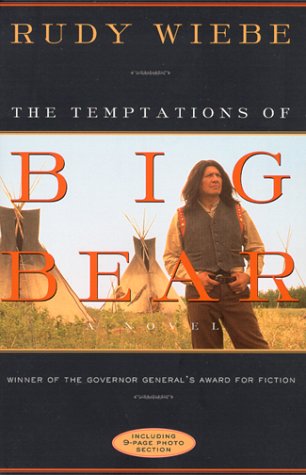-
The Mad Trapper
Rudy Wiebe
Paperback (Red Deer Press, Jan. 29, 2003)When it began, he was just another stranger without a name. When it ended, he was the most notorious criminal in North America, the object of the largest manhunt in RCMP history. This is the story of Albert Johnson, the Mad Trapper, a silent man of superhuman strength and endurance, who defied capture for fifty days in the bitter cold of winter, north of the Arctic Circle. He was a man who crossed hundreds of miles of frozen tundra on foot, who survived dynamite blasts and the pursuit of police, trappers and the army, and who became the first man to cross the Richardson Mountains in a blizzard. Z+
Z+
-
The Temptations Of Big Bear: A Novel
Rudy Wiebe
Paperback (Swallow Press, Sept. 15, 2000)Winner of the Governor General’s Literary Award, 1973Rudy Wiebe's The Temptations of Big Bear is an epic of the Canadian West. As the buffalo-based food supply vanishes, Big Bear leads his Plains Cree nation across the prairie in search of a means of retaining the way of life quickly being lost—a life his people have lived for thousands of years. Against the onslaught of the White Queen's representatives, Big Bear resists pressure to cede the ancestral right to the land of his hungry but free people in exchange for temporary nourishment and a reserve. In this award-winning novel, Rudy Wiebe brings alive the heroism and dignity of Big Bear's fierce struggle for justice that tore apart the Cree community and his own family. The Temptations of Big Bear is a beautifully written and moving novel about a tumultuous period in the history of the West.
-
The Mad Trapper
Rudy Wiebe
Hardcover (McClelland and Stewart, Aug. 16, 1980)Book by Wiebe, Rudy [signed]
-
The Mad Trapper
Rudy Wiebe
Paperback (Bantam Seal Books, Aug. 16, 1981)The Mad Trapper, Albert Johnson...
-
The temptations of Big Bear
Rudy Henry Wiebe
Hardcover (McClelland and Stewart, Jan. 1, 1973)âWhat can that mean, I and my family will have a âreserve of one square mileâ?âSo asks Big Bear of Governor Morris, come to impose a square treaty on the round, buffalo-covered world of the Plains Cree. As the buffalo vanish and the tension builds to the second Riel Rebellion, Big Bear alone of the prairie chiefs keeps up pressure for a better treaty by refusing to choose a reserve. He argues, âIf any man has the right to put a rope around another manâs neck, some day someone will get choked.âIt is Big Bearâs story â and the story of Wandering Spirit, of Kitty McLean and John McDougallâthat is told in this novel with rare and penetrating power. Permeated with a sense of place and time, this eagerly awaited work by Rudy Wiebe reflects the authorâs sensitivity to the Canadian prairies, their history, the minds and hearts of their diverse people.Exploring Big Bearâs isolated struggle, Wiebe has encompassed in one creative sweep not only his heroâs struggle for integrity, but the whole range and richness of the Plains culture. Here is the giant circle of the prairie horizon, and the joy, the sorrow, the pain and the triumph and the violence of unconquerable human beings faced with destruction.
-
African Americans
Ruth Wiebe
Paperback (Mason Crest, June 25, 2009)Discusses the experiences of African Americans in the United States and details the lives of such successful African Americans as Clarence Thomas, Condoleezza Rice, Iman, and Freddy Adu. O
O
-
The Temptations of Big Bear
Rudy Henry Wiebe
Paperback (McClelland & Stewart Ltd, Jan. 1, 1984)New Canadian Library N122.
-
The Temptations Of Big Bear
Rudy Wiebe
(McClelland And Stewart Limited, Jan. 1, 1972)None
-
The Temptations of Big Bear
Rudy Wiebe
(McClelland & Stewart, Jan. 1, 1976)None
-
The Temptations Of Big Bear: A Novel by Rudy Wiebe
Rudy Wiebe
None
-
Temptations Of Big Bear
Rudy Wiebe
Early in his writing career, Rudy Wiebe’s imagination was caught by a heroic character of Cree and Ojibwa ancestry whose birthplace was within twenty-five miles of where Wiebe himself was born 110 years later. The man’s name translated into English was Big Bear, and he came to be the subject of one of Wiebe’s most highly praised works of fiction. A modern classic, Wiebe’s fourth novel is a moving epic of the tumultuous history of the Canadian West. The book won the 1973 Governor General's Award, and in the 1990s was made into a CBC television miniseries based on a script co-written by Wiebe and Métis director Gil Cardinal, shot in Saskatchewan’s Qu’Appelle Valley.From the early days of North America, European settlers forced Natives aside, taking over their land on which they had lived for thousands of years. Big Bear envisioned a Northwest in which all peoples lived together peaceably, and in the 1880s made history by standing his ground to keep his Plains Cree nation from being forced onto reserves. The buffalo food supply was vanishing, but Big Bear led his people across the prairie, resisting pressure to cede rights to the land and give up freedom in exchange for temporary nourishment. The struggle brought starvation to his followers, tearing apart the community and eventually his own family. The story follows Big Bear’s life as he lives through the last buffalo hunt, the coming of the railway, the pacification of the Native tribes, and his own imprisonment. Wiebe’s magnificent interpretation of Western Canadian history encompasses not only his hero's struggle for integrity and justice but also the whole richness of the Plains culture.